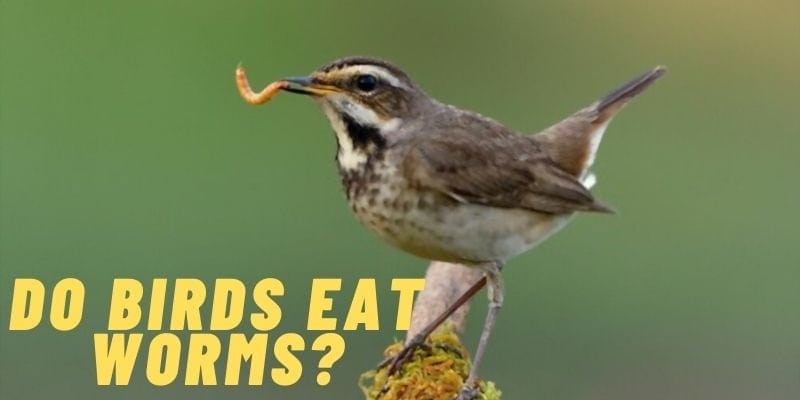Birds are known to eat fruits, vegetables, insects, and many other foods. But not all birds feed on all the different types of foods. So the question that arises here is, do birds eat worms?
The straightforward answer to this question is yes, birds do eat worms, and many species of birds enjoy eating worms. However, some species of birds are not usually seen to eat worms, which we will discuss further.
Table of Contents:
- Do Birds Like Worms?
- Why Do Birds Eat Worms?
- How Do Birds Find Worms?
- Benefits Of Feeding Worms To Birds?
- What Birds Eat Worms?
- What Birds Don’t Eat Worms?
- Do Birds Eat Dead Worms?
- Final Words
Do Birds Like Worms?
Yes, birds love to eat worms. Worms are one of the favorite meals of all birds. The reason why birds love worms is that they are full of proteins.

Birds crave protein, which is an essential part of their diet and necessary for their healthy development. The most common worms that birds eat are mealworms.
What Birds Eat Mealworms? (List of Birds That Eat Mealworms)
These worms can be easily found in backyards or gardens. If you are feeding a pet bird, you can also find dried mealworms in the market. Both are equally delicious to birds and full of nutrients necessary for a bird’s growth.
Other birds who usually feed on fruits and vegetables can also eat mealworms, so these are their favorite worms for them. Do birds eat wasps?
Why Do Birds Eat Worms?
As mentioned earlier, worms are a great source of proteins for birds. Also, some birds are invertebrate feeders, which means their main food consists of insects.
But this is not the only reason birds eat worms, and they are readily available natural sources of vitamins and minerals. These are abundant and easy to catch as well.
Birds do enjoy hunting the worms. Wild birds hunt and eat them more frequently than pet worms.
How Do Birds Find Worms?
All birds almost use all of their senses to find worms. But different species and even birds in the same species tend to rely on one primary sense more than others. Worm-finding techniques used by birds vary for all birds.
According to scientific research, all birds mostly use their different sensory directions methods to find worms. Worm hunting methods vary for every bird.
It is also majorly affected by environmental circumstances. Here are some significant senses used by birds to find worms.
Sense of Touch
While hunting for worms, birds use their sensory methods through their feet. Birds can feel the subtle movement of worms in the grass and the soil beneath the soil.
But, birds cannot hunt the worms all alone using the touch senses. Touch senses work in cooperation with other primary senses. Different birds develop their hunting techniques based on their environment.
Vision
Vision is one of the significant primary senses used by birds for hunting worms. All birds have exceptional vision, and they can spot the tiny tail of worms poking out of the soil.
Some bird species have monocular vision, which means they can use one of their eyes independently. So they can focus on the soil closely while looking around for other movements and then strike the worm.
Birds usually cock their heads while using their monocular vision, and it’s an excellent worm-hunting method.
Hearing
Hearing is also a supportive sense used by birds for worm hunting. As mentioned above, birds have sensitive touch sensory directions copped up with exceptional eye vision.
While monitoring every subtle movement, they can hear very low-pitched noises produced by the movements of worms, which helps them track the exact location of the worms.
The other remaining senses of smell and taste are yet not proven to support worm hunting as these senses are generally weak in birds. Hence vision is the major sense used for incorporation with other primary senses.
Benefits Of Feeding Worms To Birds?
Worms are ideal feed for omnivorous birds, and these birds would eat any worm. They are one of the healthiest foods for birds as it is full of proteins and essential vitamins and minerals (Calcium, Magnesium, Iron, Potassium, Copper, and Phosphorus).
You Might Also Like: Can Baby Cardinals Eat Worms?
These nutritional supplements are necessary for the proper development of muscles, and feathers in birds, especially in growing birds.
Being readily available in nature, birds can find worms almost anywhere, plus they seem to be pretty delicious to birds. So is there anything left to know about the benefits of feeding worms to birds?
When it comes to feeding worms to pet birds, it can be risky to let them hunt on their own. Because, unlike wild birds, pet birds usually have low immunity.
Worms living around your backyard or in a garden might be exposed to pesticides and other toxins. So, it is recommended to feed worms from the pet store.
You might be wondering why pet store worms are safer than others. Because worms are a typical diet of many reptiles, the industry has grown a lot. Pet store worms are free of any toxins and 100% safe to feed your pet birds.
What Birds Eat Worms?
All omnivore birds eat worms, and these include the following species.
- American Robin
- Black-bellied
- Plovererican Woodcock
- Black-tailed Godwit
- Clapper Rail
- Common Blackbird
- Eastern Screech-Owl
- Eurasian Blackbird
- Killdeer
- Malayan Night Heron
- Marbled Godwit
- Rufous-breasted Antthrush
- Sora
- Semipalmated Plover
- Short-billed Dowitcher
- Song Thrush
- Thrush
- Tit
- Wrens
These are birds that are omnivores and eat worms as one of their primary diets.
What Birds Don’t Eat Worms?
We have always seen graphic illustrations, cartoons, and even movies that all birds love to eat worms. But here’s the fact not all the birds eat them.
Yes, there is only a small group of birds who eat them. The number of different bird species varies in different areas of the world. That’s why it’s just a myth that all birds eat them.
All birds except the ones mentioned above don’t eat worms. The most common examples are Doves, Eagles, hawks, and owls.
They don’t consume the worm, and nor do they feed their babies “worms.” We have mentioned this several times that only omnivore species of birds eat them.
But a small number of bird species feed their babies worms only in spring, and they are fruit and seed eaters all around the year except in the spring season.
You must be thinking, why the spring season? These birds only consume mealworms which are misunderstood as general worms. Mealworms are the larva of the mealworm beetle.
They only eat them or feed their babies to complete the nutritional values. The most common season to find mealworms is spring.
Do Birds Eat Dead Worms?
Generally, most birds, except a few, don’t eat dead animals. Birds don’t eat dead worms. As mentioned earlier, birds use their primary senses to hunt worms.
This hunting process is mainly related to the movement of worms, and dead worms don’t stimulate birds to hunt. That’s why they ignore the dead worms.
Another primary reason birds don’t eat dead worms is that dead worms rapidly attract bacteria and start decomposing, creating a specific odor. Birds stay away from those toxic worms’ carrion because dead worms can be high in toxins.
Final Words
Birds are not selective when it comes to eating. Birds can eat mosquitoes, insects, fruits, vegetables, and also hand-made food without any hesitation.
But worms are also full of healthy nutrition required for birds. So birds do eat worms and get benefitted from all the nutrition present in worms. Birds usually use their senses to find worms and hunt them for eating.
Follow me on
Birdskeeping is supported by its readers. When you purchase through links on our site, we may earn an affiliate commission. Also, as an Amazon affiliate, we earn from qualifying purchases without costing you extra.

